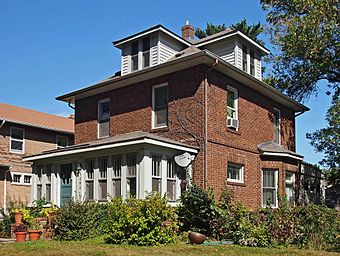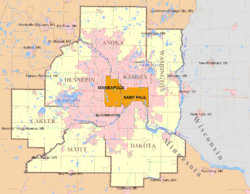Casiville Bullard House facts for kids
Quick facts for kids |
|
|
Casiville Bullard House
|
|

The Casiville Bullard House viewed from the southwest
|
|
| Location | 1282 Folsom Street, Saint Paul, Minnesota |
|---|---|
| Area | Less than one acre |
| Built | 1909–1910 |
| Built by | Casiville Bullard |
| Architectural style | American Foursquare |
| NRHP reference No. | 96001559 |
| Added to NRHP | January 9, 1997 |
The Casiville Bullard House is a special old house in Saint Paul, Minnesota. It was built between 1909 and 1910 by a skilled worker named Casiville Bullard (1873–1959). He was a stonemason and bricklayer. Casiville Bullard was one of the few African-American skilled builders known in Saint Paul during the early 1900s.
This house is important because it tells us about black history and social history in the area. It was added to the National Register of Historic Places in 1997.
Contents
Casiville Bullard's Story
Early Life and Learning Skills
Casiville "Charlie" Bullard was born in Memphis, Tennessee, on February 24, 1873. His parents had been enslaved people who worked picking cotton. Casiville was the oldest of seven children. He spent his younger years picking cotton and taking care of his siblings.
Even though he only went to school until third grade, a relative taught him building skills. These skills included stonemasonry (working with stone), bricklaying (working with bricks), and plastering (applying plaster to walls).
Skills Passed Down
During the time of slavery in the United States, many enslaved African Americans were forced to build and fix buildings. They also made clothes and did farm work. Because of this, many became very good at skills like spinning, weaving, shoemaking, carpentry, painting, and blacksmithing. This knowledge was often passed down from one generation to the next. After they gained freedom, many African Americans were experts in these crafts.
Casiville Bullard learned carpentry too. He became very skilled at cutting and laying brick, marble, and granite. He was also good at laying pine and oak wood floors.
Facing Challenges and Moving North
In the late 1800s, unfair treatment based on race began to affect the building industry in the American South. For example, local groups of the Brotherhood of Carpenters and Joiners union were separated by race. This meant black workers were mostly sent to work in poorer black neighborhoods.
Even though many skilled builders were black, many African American craftsmen decided to move to northern cities. This happened between 1890 and 1910. They hoped to escape unfair housing rules, laws that kept people separated by race, and losing their rights.
Building a Life in Saint Paul
Starting in Minnesota
Casiville Bullard first came to Saint Paul in 1898. He did stonework for the third Minnesota State Capitol building. This building was designed by a famous architect named Cass Gilbert. For a few years, he worked in Minnesota only during certain seasons.
But in 1902, he and his wife, Addison (Addie), moved to Minnesota for good. Their first child, Lillie, was born in Saint Paul that same year.
Building Their First Home
Soon after, Bullard bought land at 1282 Folsom Street in the Como Heights area of Saint Paul. His family lived in a tent on the property while he built a wooden house. He started building this house by 1904. Bullard worked on this house at night after his regular workday. His wife often held a kerosene lamp to give him light.
Joining the Union
Bullard was a member of the Bricklayers Local #1 union. This was very unusual for an African American person at that time. He likely joined the union in Tennessee and then transferred his membership to Saint Paul. Being a union member meant he could get unionized work. Most big construction jobs in Saint Paul in the early 1900s were done by union workers.
A Highly Skilled Builder
Bullard was well-known for his skills. It was rare to find someone who was good at both brick and stone work. He was part of the team that built many important buildings in Saint Paul. These include the Federal Courts Building (now the Landmark Center), the Cathedral of Saint Paul, the Minnesota Governor's Residence, Saint Paul Union Depot, and the Highland Park Tower.
The Casiville Bullard House
Bullard was known as an expert in his field. He used all his skills, including carpentry, to build his family's second home. This house is located at 1282 Folsom Street and was built in 1909.
The house has two stories and is built of brick. It has an American Foursquare design, which was a popular style. It also has a front porch, a back porch, and a bay window. Some windows in the house had pretty stained glass. Just like his first home, Bullard built this house in the evenings after his work.
The Bullard family grew to twelve people by 1917. They lived in the brick house on Folsom Street until 1919. Then, they moved to another, larger property a few blocks away. Casiville Bullard lived in three other homes before he passed away on June 1, 1959.




